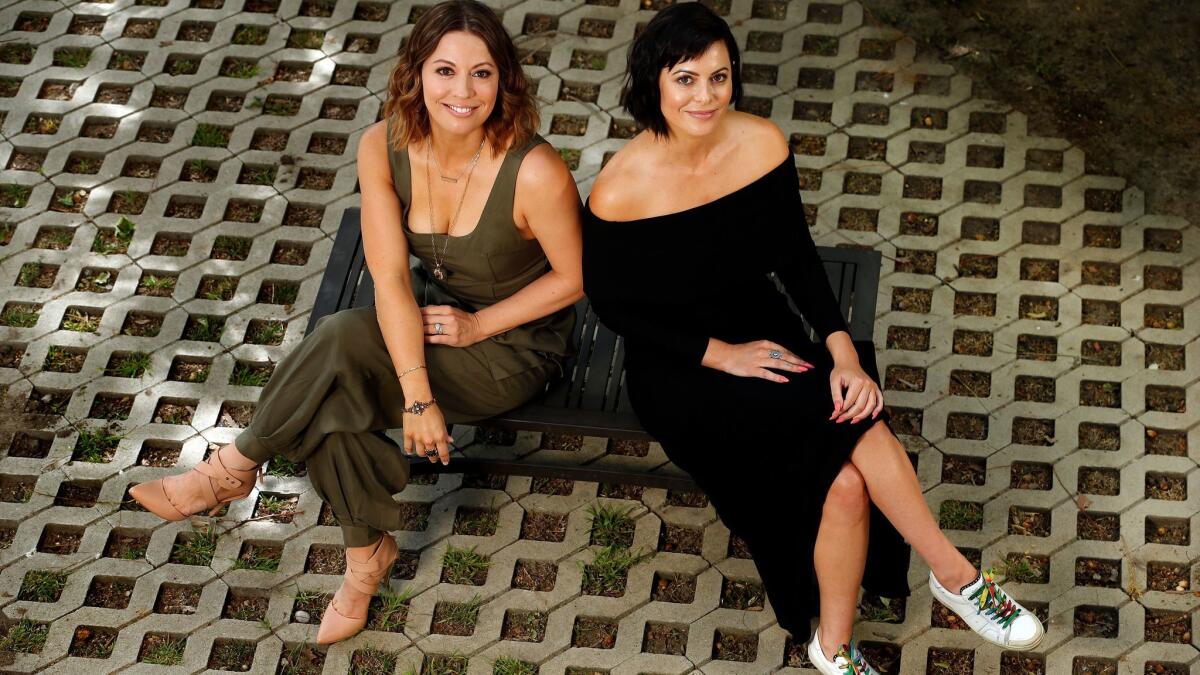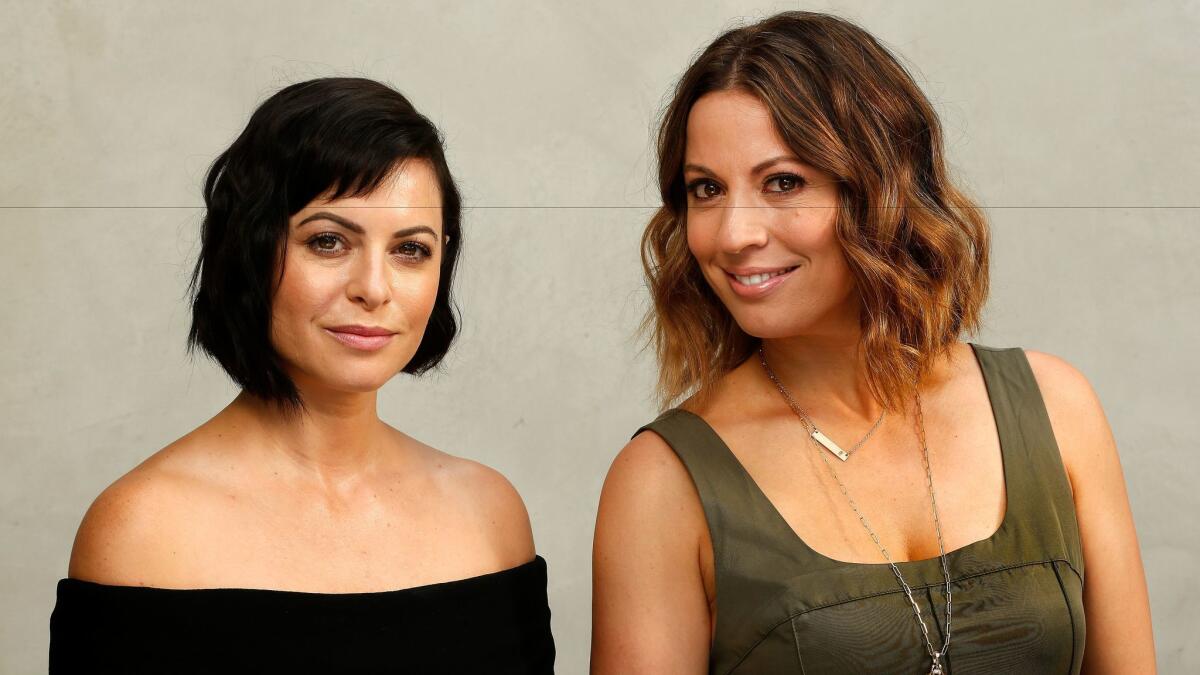The women behind ‘Girlboss’ talk pushing back and taking control

Screenwriter Kay Cannon’s road to helming a Netflix comedy series all started a few years ago because a host of Oscar-nominated films left her ungratified.
“I think ‘Joy’ and ‘Wild’ were like the two movies that had anything to do with women,” says Cannon. “About 98% of the rest were all flawed men. I was starving for more stories that focused on the woman, stories that had little or nothing to do with who she was romantically linked with, and everything to do with her figuring life out.”
Then Cannon, the brains behind the “Pitch Perfect” film franchise, got an email from her agent. Actress and producer Charlize Theron had optioned the rights to the bestselling memoir-self-help mashup,”#Girlboss,” from Nasty Gal founder Sophia Amoruso, which documented her rise from shoplifter to e-commerce fashion boss. Theron wanted Cannon to bring it to life.
“What I was really touched by was how much that book was about the amount of failure you have to go through in order to succeed,” Theron says by phone. “Kay is a brave woman and she brings that to the female characters she writes. She’s not scared to put them in circumstances where they might not look great, but she’s always very truthful about those circumstances being very real for women.”
With “Girlboss,” which is streaming now on Netflix, Cannon aims to do just that. The series stars Britt Robertson (“Tomorrowland”) as the fictionalized version of Amoruso in her early 20s. In the first of the 13 episodes, Sophia does things like steal a sandwich from her boss and shoplift a rug right in front of a store clerk.
“We’re not telling a fairy tale,” Amoruso says. Her own story is still evolving — bumps and all. She stepped down as the chief executive of Nasty Gal in 2015, the company filed for bankruptcy and has been acquired by British retailer Boohoo. She recently launched a new media company called Girlboss.
“I was starving for more stories that focused on the woman, stories that had little or nothing to do with who she was romantically linked with...”
— Kay Cannon, executive producer and showrunner of Netflix’s “Girlboss”
At Cannon’s Studio City home, Amoruso and the screenwriter talk more about the series. Here’s an excerpt from that conversation.
Sophia, how important was it for you to have a woman helming the series?
Amoruso: For me, there was never a consideration of anyone other than Kay. I think it’s an interesting time for women in that it is more OK than ever to be honest about our shortcomings. For me, that has happened on a very public stage. For a woman to be telling that story is incredibly important. Otherwise, it just wouldn’t be genuine.
Cannon: It was really interesting in the writers’ room, because there were more women than men. All the women were alphas. It was the most encouraging, positive experience— everybody was heard in that room. It’s like an advantage for men, I think, at this point, to not be the loudest one in the room necessarily. It’s like a new alpha.
How do you wrestle with this Hollywood idea that female characters need to be likeable?
Cannon: I just keep going back to, at the end of the first episode of “Mad Men,” you weren’t like, “I hate Don Draper” because he was extremely flawed. You actually rooted for this extremely flawed man. With “Girlboss,” I wouldn’t have told the true story if I had made her demure and polite and sweet. I think it’s just time that we reflect who women are in society for real.
When a [woman’s] lost and doesn’t know what her passion is in life, that manifests itself in different ways. For some people, it’s anger. For a lot of people, it’s sadness and depression. In this case with Sophia, we made the choice that it was anger, and that she’s living out loud, and she’s lashing out. If you watch the show and continue to watch the show, you see the growth.
Amoruso: You’re not born self-aware.
Cannon: Especially when you’re in your early 20s. I come from the improv community. When I was coming up, I remember there being so many angry, young, competitive, white dudes. That was OK. But for the girls, you just had to be really good to stay on the team. We weren’t totally allowed to do that. The minute you opened your mouth in the same way the guys did, you were crazy. Why I’m so excited about the show coming out is I cannot wait to be able to say, “I know this might be uncomfortable to a lot of people, but it actually speaks to millions of young women who have been paralyzed with fear not to live their lives the way that they want to, or speak their truth.” It’s going to give them permission to do so. Even more, it’s going to give them permission to suck, and to make mistakes, and to fail. I wish I had a show like this, when I was that age, to put a fire under me.

How was your pitch for this show received by network executives before it landed at Netflix?
Cannon: A big part of it is casting, and I think a big hard sell was that we were casting a young woman to be funny, and to be all these things. Britt Robertson is so amazing. For some networks, it was like, “Who are we going to get?” — this is another thing we need to change is, the list of actresses that green light things is very small. I think the list for guys is incredibly long, and you’re kind of like, “How does that guy get something made?” I’m trying really hard to make the girls list longer.
But I was on an overall deal with 20th Century Fox TV, and we pitched them what I thought the show would be, the first episode. They were my bosses, and they were thinking about things that they have to think about, that I don’t. They were like, “You can’t call it ‘Girlboss’ ” and “make it more for men.” I’m a people pleaser, so I was like, “OK, let me see. Let me see what I can do here.” Charlize was sitting next to me, and Charlize was like, “Uh-uh [negative].” She was very vocal about not doing any of that —
Amoruso: Could you imagine what the show would be if it was on Fox? I’d be feeling really different right now.
What is a Girlboss to you?
Cannon: I think a Girlboss is just someone who’s the boss of her own life. It can be what you want it to be.
Amoruso: It’s the idea of giving yourself permission to do great things, and giving yourself permission to stumble, as well. You’re living your life for yourself, and you hope that the people that you love will come along with you and understand that.
“[A Girlboss] is the idea of giving yourself permission to do great things, and giving yourself permission to stumble.”
— Sophia Amoruso, author of “#Girlboss”
When did you feel you earned that moniker, where you had that voice or confidence to be unafraid?
Cannon: My first job was at “30 Rock” and I knew I had so much to learn. I was just constantly learning. I’ve always been very vocal, I’m not shy. But it wasn’t until the last season, or second to last season where I felt like I had learned so much that I pushed back, maybe a little bit. I was vocal in a way that’s hard to explain because I had such an amazing experience there. I don’t want to seem like I was disgruntled. I just I felt like I had put in the 10,000 hours and I had done my homework. When I left that job, any job I’ve worked on since then, I felt very confident in my abilities.
Amoruso: I was always dumb enough to think I could do things — either dumb or entitled, or bored, or not satisfied with whatever was in front of me. It was always like, “No, I want to choose! I want to create my own way.” But I think after several years of running a company and finding a little bit of my place in this world — I’m still finding my place in this world, and I hope I always am — there’s a level of confidence that I gained from knowing that I was good at something. It’s very much what the show’s about, it’s like, “I know I’m talented, I know I’m smart.” It really only comes through literally feeling your way through the world.
The most-read Entertainment stories this hour »
‘Girlboss’
Where: Netflix
When: Any time
Twitter: @villarrealy
More to Read
The complete guide to home viewing
Get Screen Gab for everything about the TV shows and streaming movies everyone’s talking about.
You may occasionally receive promotional content from the Los Angeles Times.







